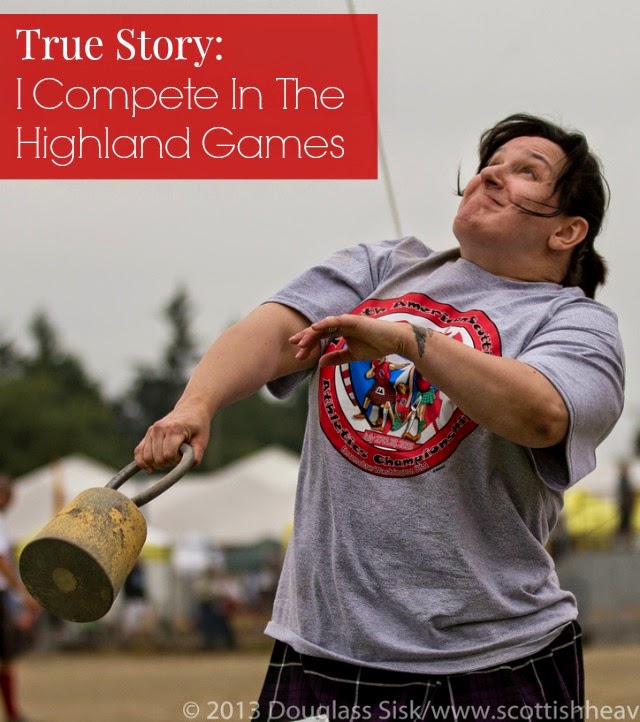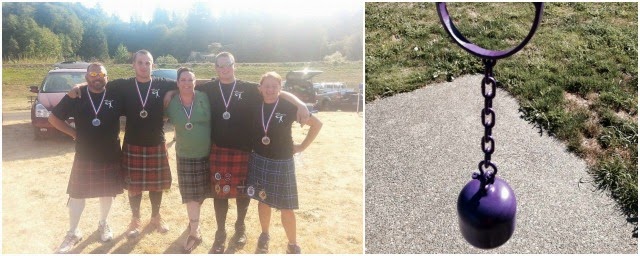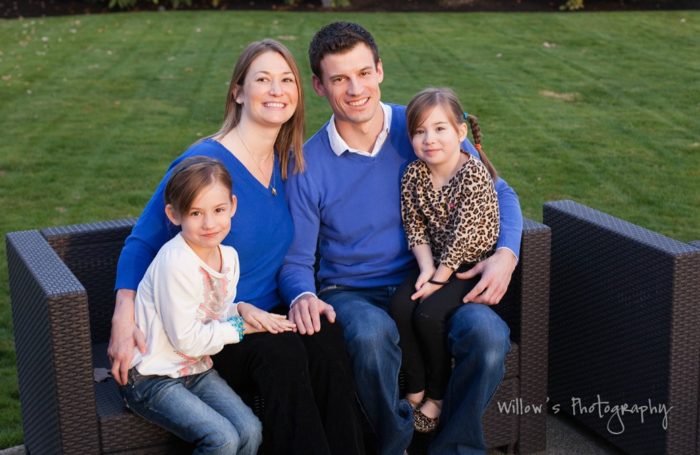This is one of many True Story interviews in which we talk to people who have experienced interesting/challenging/amazing things. This is the story of Michelle and her affinity for competing in the Highland Games.
Tell us a bit about yourself!
I was born and raised in the Seattle area. I now live in Kirkland, about 15 miles East of Seattle (and ironically, a town that was founded by a Scotsman, Peter Kirk). I work at Premera (a healthcare payer) and am the leader / lead singer of a blues band called
Michele D’Amour and the Love Dealers. I also participate in the Scottish Highland Games. I am 48.
For those of us who don’t know, what are the Highland Games?
Highland Games are an ancient tradition; I’ve heard it said that they happened as early as 2,000 BC. The contests of strength were a means of selecting the most able men for soldiers and couriers.
King Edward I of England prohibited Scotsmen from possessing weapons during the Wars of Scottish Independence in the late 13th and early 14th centuries. In the absence of weapons of war, the Scots turned to alternative methods of military training – Highland Games. In the games, they could train with hammers, pitchforks, stones, and the like – obeying the letter of the law but not the spirit of it.
The first Highland Games in the US took place in New York in 1836. Today, in addition to the Games all across Scotland itself, there are more than 200 annual games and gatherings across the US and Canada, with games also held in New Zealand and Australia.
There are nine athletic events – I will explain what each is, a bit later.
The Highland Games originated in Scotland. What’s your personal connection to Scotland and Scottish culture?
I have about a thimbleful of Scottish heritage, but being Scottish isn’t a prerequisite to participating in the Games! I used to be a competitive powerlifter, and going from that to Highland Games is a fairly natural progression.
My naughty answer to this question is that I always felt an affinity for Scottish culture, and “wanted a little more Scottish in me,” and solved that problem by marrying a Scotsman a few years ago!
Which competitions do you take part in?
In addition to my other musical pursuits, I also play harp. I used to go to Highland Games (which usually have a music / dancing component in addition to the athletics) and played Celtic music with other harpists. During the breaks from playing, I’d go watch the athletic competition. Call me crazy, but I always thought it looked like fun!
When I was setting my goals for 2013, I asked my husband if he thought I could do Highland Games, and he was very encouraging. I walked onto the field of the Enumclaw Highland Games in July 2013, having studied the events and trained, but not having worked with any of the implements. I told the judges that, they assigned someone to coach me in the moment, and I literally learned each event minutes before I had to compete. I did OK – and at the end of the day, not only was I hooked, but the judge took me aside and said, “You need to keep doing this.”
You asked what the events are, and which I do: There are nine events and I do them all, because not doing them all isn’t an option. And why would I want to miss out on all the fun?
Caber Toss. This is probably the event people most associate with Highland Games. It involves picking up and then flipping a long pole end over end. It’s a feat of precision, because you will get a perfect score if the caber is at 12:00 from where you were standing when you flipped it. For an idea of scale, a women’s caber will be around 13 feet long and 40 pounds on the low end, up to 15 or 16 feet and 80 pounds on the high end. Last weekend, some of the men were working with one that was 18 + feet long and 137 pounds.
Weight over bar. This involves throwing a lead weight up over your head and behind you, over a bar. The women’s masters (40+) weight is either 21 or 28 pounds.
Weight for distance. This is two events – light weight (14 pounds) and heavy weight (21 or 28 pounds). You take a lead weight on a chain, with a handle, and spin either once or twice, and throw it as far as you can.
Braemar. This is like shot put, only with a large stone – usually around 20 pounds. At the Portland (OR) Games, the Portland Stone is 49 pounds. I managed to throw it about 8 feet last year; I am going to train specifically for this to see if I can do better this year.
Open Stone. Again, like shot put, but with a 8 – 12 pound stone for women; the men’s will be 16 – 22 pounds.
Hammer. This isn’t an actual hammer, but a lead weight on a PVC pipe or bamboo stick. There’s a heavy hammer and a light hammer; for women, they are 16 and 12 pounds, respectively.
Sheaf Toss. This involves taking a burlap square that’s packed with hay, spearing it with a pitchfork, and then tossing it up over your head and behind you, over a bar. The women’s sheaf weighs 10 pounds.
My first year, I only participated in one game. Last year, I did five. This year, I will probably end up doing five or six. I have already completed my first games for the year last weekend in Phoenix.
Do you actively train for this?
Oh, heavens yes. I still do my powerlifting lifts (squats, deadlifts, and bench) as well as Olympic lifts (cleans) and lots of work to strengthen my core and build speed. I’m not particularly tall for these games, so I have to be fast. I work out in the gym 3 – 4 days per week, plus I practice with the implements a couple of days a week.
Walk us through a day at the Highland Games.
8 a.m. arrive at the gates, kilted up and ready to go. Check in with the judges, get the games schedule, and start warming up.
9 a.m. there’s usually a rules and safety briefing. This almost always involves us being admonished not to curse, because children are watching / listening.
We will then progress through the events from there. It usually takes an hour or so per event, depending on how many people are in each division. There will be a break for lunch. If there is a meat pie vendor at the Games, that’s where I’ll usually head for lunch. Other people will visit the beer tent.
From there, each group will get through their events till everyone is done, then there are awards and stories, and more visiting of the beer tent.
Have you ever seriously hurt yourself?
There are several events going on at once, with rocks flying and cabers flipping and weights being tossed. You really have to be careful out on the field and be aware of your surroundings. Aside from that, it’s important to stay hydrated, watch your form, and just have fun.
I have seen some folks get pretty badly injured; the worst injury I have had so far was in Phoenix last week, when the open stone bounced up and hit the top of my foot. (I was standing in the field waiting my turn, and was supposed to be picking up the stone after the previous competitor threw it.) I walked it off and kept going, but about an hour later I looked down and thought, “Wow, my shoelaces are bulging…that can’t be good.” I still went on to throw a PR (Personal Record) in light hammer, though. My foot was bruised and swollen, but fortunately not broken.
How do the people in your life feel about you Highland Game-ing?
My husband is a great supporter and thinks it’s great. I’ve started teaching the events to my son, who is 13 (some of the Games have a youth division; otherwise he’ll have to be 18 before he can participate, if he chooses to).
Just about everyone else thinks it’s some mix of weird / crazy / cool.
What’s one thing you’ve learned from this that any of us could apply to our daily lives?
I have to go with one of my favorite quotes here, from Goethe: “Whatever you can do or dream you can, begin it. Boldness has genius, power and magic in it!”
Thanks so much for sharing, Michelle! Do any of you guys compete in a particularly unusual or challenging sport?














I played rugby in college which was a far cry from my dance team efforts in high school. But the possibility (or reality) of getting a concussion or breaking my nose kept me from continuing to play.
I met and know Michele and her husband through music and musical connections and she’s a delightful person who has become a dear friend. I can’t speak for all the people in her life, but I think it’s 100% cool. Maybe my mix is off… 🙂